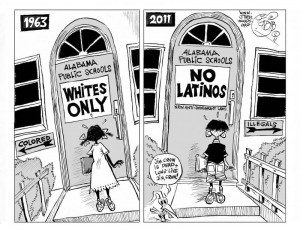
Last night at dinner, a visiting 7-year old was trying to explain to me that duck-billed platypuses (platypi?) are actually mammals, even though they lay eggs.
“But doesn’t the fact that they lay eggs automatically disqualify them from being mammals?” I asked skeptically.
She was exasperated in the way that only an especially precocious schoolage child can be. “That’s why they’re special,” she answered in her best “Duh” voice. “They lay eggs and they feed their young.”
I looked it up today and yes, sure enough, that platypus is a real category-bender. Learning about it kinda made my head explode, but in a good way. It also got me thinking about some other taxonomy questions that have been bothering me all week — in particular, questions of Mormon classification, and how uncomfortable many people are with Latter-day Saints who claim to be both/and rather than either/or.
Later this week I’ll be heading out to the Sunstone Symposium, where I’ll speak about my fall book Flunking Sainthood and the Twible project in different sessions. For those of you who don’t know, Sunstone-goers represent the liberal or alternative voice within Mormonism. In the 1980s and early 90s the symposium and the magazine also had a reputation for being angry or having an axe to grind against the LDS Church, although that hard edge has somewhat diminished. The symposium is a place of free inquiry based upon Anselm’s motto of faith seeking understanding.
I’ll also hit a couple of sessions at FAIR-LDS, a Mormon apologetics group that is committed to helping Latter-day Saints better understand their own religion and be able to “faithfully deal with the criticisms leveled against the Church and gospel.” Like any apologetics organization worth its salt, its basic mission is to intelligently defend the religion against outside attack. FAIR takes it for granted that Mormonism is true, and seeks primarily to find better ways of persuading the world of that.
When I can, I read the writings of both groups, and have found many of their speakers to be persuasive. These people have helped me better understand my own religion. However, both groups fall into a bit of a taxonomy problem; both can be narrow in their own ways. Some people at Sunstone become bitter when they think the Church is doing damage in the world, whether to homosexuals or women or their own family. Some people at FAIR are so narrowly focused on saving Mormonism from persecution that they rarely or never stop to consider that the detractors could have a valid point, and the Church might just be dead wrong about something.
What both groups share is a strange, and largely false, belief in the utter uniqueness of Mormonism. Some Sunstoners imagine that the LDS Church stands alone in having deep institutional flaws, while some FAIR folks imagine that the LDS Church stands alone in possessing Truth with a capital T.
I only know of a few other duck-billed platypi who, like me, choose to swim in both communities. But both communities are helpful and needed, even though neither is perfect.
What I’m saying is that the big tent that is the LDS faith needs every possible kind of Mormon.
Later this week, I’ll be attempting to answer ten questions about Mormonism that evangelicals have raised on Rachel Held Evans’s blog. The “Ask a Mormon” opportunity includes some excellent questions about LDS religion and history as well as my own faith journey. (I’ll post a few of them below, if readers have helpful insights. I can definitely use some help.) I’m acutely conscious that having a single person to represent a 14-million member religion gives rise to potential pitfalls.
On the other hand, all any of us can ever do is tell our own story. Mine is that I am a duck-billed platypus, hopefully without the deadly venom.
A Few “Ask a Mormon” Blog Questions
3. From Teri: What’s the deal with the planets? Does God really live on a planet? Do faithful Mormon men really get their own planets? Does that mean they become gods? I’ve been hearing little bits and pieces of this since I was in high school (in a place with a large Mormon population) and it’s always been so confusing
5. From Laura: From the outside perspective, it seems the Mormon church holds very firm stances on certain issues and then will suddenly reverse course, especially in the cases of polygamy and institutionalized racism. This makes it appear to outsiders as if God is changing His mind. How is this explained from within the Mormon church?
6. From April: I am curious about the very secretive things that happen in the Mormon temple. I have a friend who attends a Christian reformed university with me and we always discuss how similar he feels Mormonism is to mainstream Christianity, but then I get confused when he says there are things that he’s not allowed to discuss. If, (and please forgive me if I am wrong), Mormons believe that we are all members of the body of believers then why would there be secrets that you couldn’t share with other, non-Mormon, Christians?
7. From Laura: I’ve heard many times that women are granted access to peaceful eternity only through the permission of their husbands, particularly that when you are sealed the husband is given your secret eternal name needed for you to enter eternity with him. Is this true? What about single women?
8. One reader noted that the reported history of the Book of Mormon has been seriously called into question by archeology. Is it respected in your faith to interpret that content symbolically, or is everyone supposed to literally believe it?

